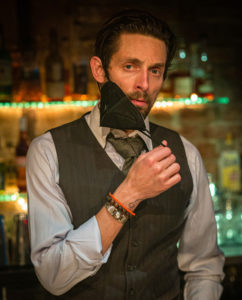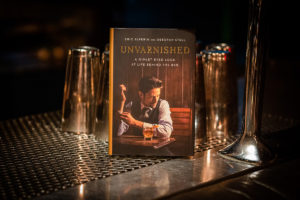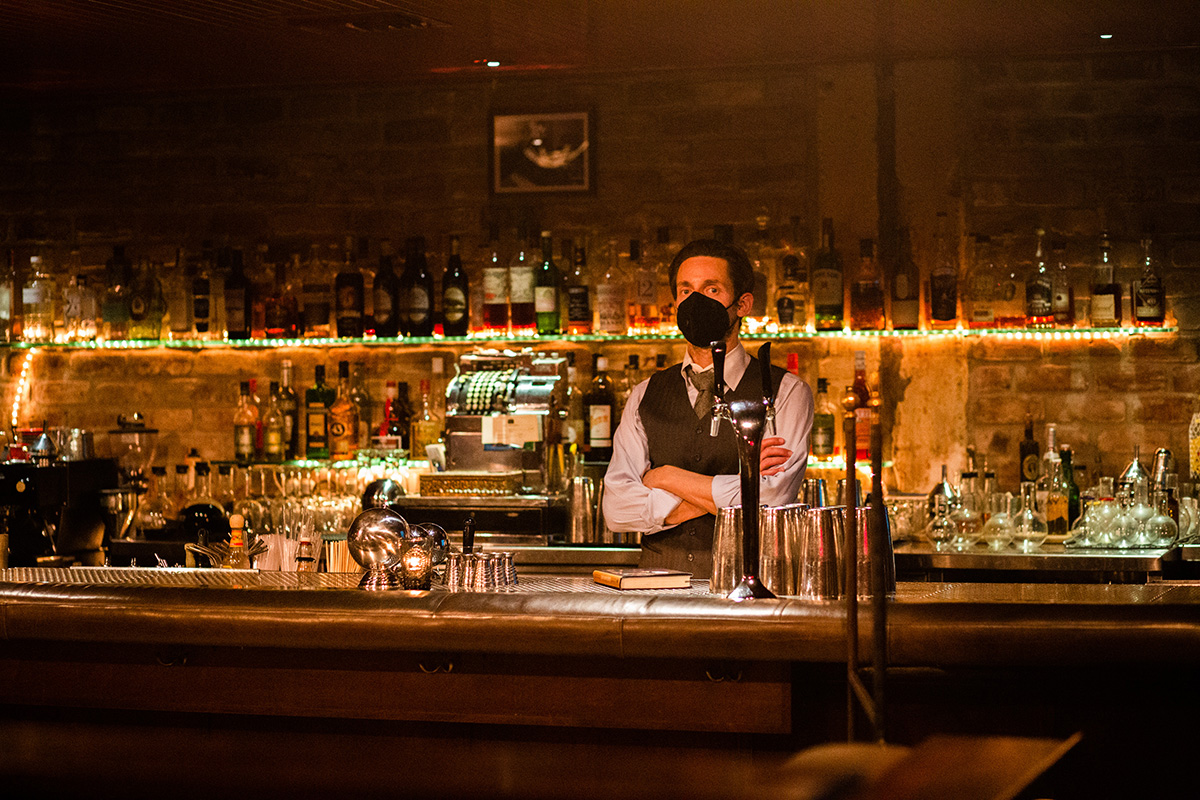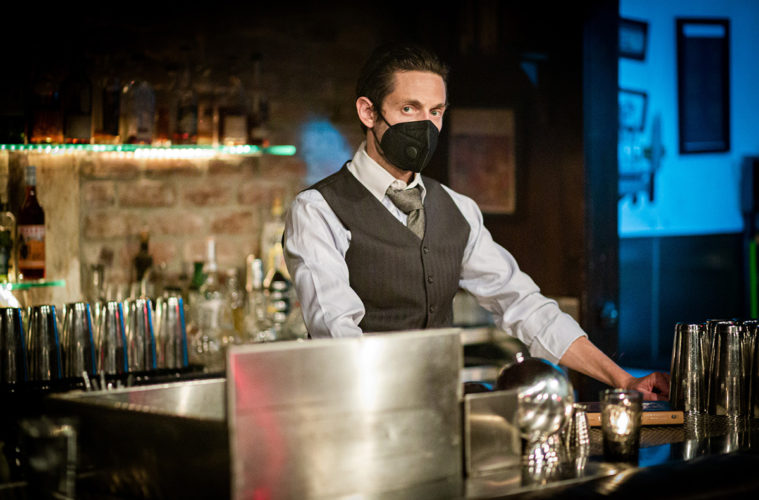The way master mixologist Eric Alperin sees it, the bar is a conduit in people’s lives, like connective tissue. People go from one major organ — like home or family — to the next major organ — like work — and then back home. The bar is the pit stop we make along the way. And until recently, it was the place we loved to sit and people watch with the soothing sound of a martini being shaken in the background.
In Alperin’s new memoir co-authored with Deborah Stoll, Unvarnished: A Gimlet-Eyed Look at Life Behind the Bar, the co-owner of one of L.A.’s most beloved watering holes, The Varnish, takes a cocktail confidential look at the rise of craft cocktail culture in Los Angeles and all the sex and drugs along the way.
The book is a tasty mix of personal stories, recipes and detailing the side effects of running a bar: Cleaning up vomit, stitching ripped leather booths, putting out napkin fires, snaking bar sinks and 5 a.m. security alarm phone calls after a tweaker puts his fist through the front door. Chapters range from how to harvest your own ice to the top 10 reasons not to date a bartender. (They do too many drugs, they drink too much and all they do is talk about work, to name a few.)
“You definitely have a vampire element to yourself,” Alperin tells L.A. Weekly at the currently shuttered Varnish, tucked behind Cole’s French Dip restaurant downtown. “You love the nightlife.”
What was conceived as a memoir, documenting his journey from working with the renowned and enigmatic mixologist Sasha Petraske at ground zero of the craft cocktail movement in New York, Milk & Honey, to The Varnish has by twisted fate become a history book on the golden era of bar culture.
With the uncertain future of bars, we wonder if we will ever be able to soak in that energy again — spotting the love of your life across a crowded room or pouring your heart out to a captive bartender.

Eric Alperin at The Varnish (Photo by Darrick Rainey)
“I miss the physical feedback of a hectic, crowded bar,” says the former actor and current partner in Cedd Moses’ Pouring With Heart group that, along The Varnish, includes Imperial Western Beer Co., Seven Grand, The Golden Gopher, The Slipper Clutch and Bar Jackalope. “I thrive off other people and I think we all have that to a certain degree. We need that. Now we’re caught in our homes, maybe with our pods that we’ve chosen. We connect with people in the postcard-sized Zoom chats and I think we’re all missing a very important part of that physical feedback. When you go out in the sun it gives you Vitamin D, and there’s a vitamin you get interacting with people that’s really important. They say only 7 percent of communication is the actual words. I think 35 percent is tone and body language is the other 53 percent.”
Alperin counts native Angeleno Moses, son of the late L.A. artist Ed Moses, one of his most beloved and valued mentors and partners, a friendship that has culminated in a successful and storied career of bringing nightlife back to the city. “To Cedd, dirty streets, abandoned corridors and crumbling buildings that block out the sun are the best parts of L.A.,” he says.
But more than anything, the book spotlights the giving and nurturing side of what a good bar provides its patrons, and the intuition it takes for a good bartender to judge if somebody needs some extra coddling, a lighter touch or a refill. He says you can teach anybody how to tend bar, but you can’t teach empathy or love.
“I can’t teach you how to care,” he says. “It’s that nobility of service. Over the years we’ve had people with no experience come in but care deeply about the service, being hospitable. That’s number one. If you don’t have the love and you don’t want to care for people, this is not for you. You stick around because you have a spine and you have a heart. That’s what people come for. Cocktails can only get so good.”
Coming from an acting background, Alperin enjoys the performance element behind the bar, which he says extends to the kitchen and the back of the house.

Unvarnished: A Gimlet-Eyed Look at Life Behind the Bar (Photo by Darrick Rainey)
“I’ve been in theater and I have always thought of the restaurant and bar business as live theater,” he says. “It’s been my way to bring it to life inside my body and soul. I appreciate cocktails and spirits, but I’m much more of a theater nerd in terms of how we do service, how we engage with people. That’s really important to me. What I love about what we decided to do in this book is tell stories. That comes from mine and Deborah’s background. We’ve lived these stories; we’ve been a part of them. Shaking up a drink is active meditation.”
And those stories include characters who have passed, like Petraske and Jonathan Gold, who Alperin first met when the former L.A. Weekly food critic did one of the first stories on The Varnish.
“We’ve lost a lot of people,” Alperin, whose publisher Karen Rinaldi also helped conceive, edit and publish Kitchen Confidential by the late Anthony Bourdain. “We dedicated the book to Jonathan; he was going to write the forward. Then as we all know, it happened very quickly, he was gone. We thought about making space for somebody else and we said nope, this book doesn’t need it. It was a singular thing with Jonathan. He really put a fire under our asses when we were younger.”
The book also takes a look behind the curtain at the king of the craft cocktail movement and another valued mentor who helped make The Varnish what it is during the golden era: Petraske.
“He was an enigma and a very private person,” he says. “That was tough. His picture goes up above every bar. He was very humble. He was an egalitarian influenced by his grandmother and her communist manifesto. He was brilliant, he was funny. He barely finished high school and went on to become an Army ranger. He read the Economist every week from cover to cover. He was Yoda for me and for a lot of people. He was so private, and I felt it was my — our responsibility — to write about him. I wanted to put something down forever about this man.”
“The only thing you can do when lose people prematurely is celebrate them,” continued Alperin. “That’s why there was no one else to write the forward besides Jonathan. There’s just one line in the dedication and we sat with that for a long time. It was good for people to see Sasha in all his foibles. He wasn’t perfect and that’s what a mentor is. They’re not perfect. It’s someone who can see what others can’t see yet. It’s not because they’re an expert. I don’t believe mentors are the experts in everything. He was so giving and would always ask what you thought. He was always interested in how you would do something. People were so turned on by that. He very much honored people and what they had to say. That’s why training with him was amazing to be a part of and watch him work with staff that we had over the years.”

Smack in the middle of the nuts and bolts and behind the scenes looks at the underbelly of the business, is a book within a book that includes collections of recipes for classic cocktails and homemade syrups inspired by his hyper days at Milk & Honey in New York.
“When we talk about sex and vice and those things in the book, you can’t live that way your whole life,” he advises. “We’re illuminating stuff that we did and were part of and others were part of. You don’t have to do coke to be in this industry at all, that’s not what we’re saying. That’s not a rite of passage to make it in this industry.”
“We’re just sharing some of the things we went through,” Alpernin says. “Sometimes people judge cocktail bars for beating you over the head with mixology. No, we just want to serve a really cold drink the way we prepare them here. The real center stage, the real star is you. What we do here is the accompaniment. I don’t think you should behave the way I behave sometimes.”
What was once a windowless kitchen storeroom where legend has it, gangster and Cole’s regular Mickey Cohen would hide out for card games and the occasion rough up, The Varnish is closed now because of the pandemic. Alperin is headed for the desert; he and his brother are resurrecting the iconic Red Dog Saloon on Mane Street in the heart of Pioneertown, which was built in 1946 as a film set by Roy Rogers and site of Gene Autry’s television show. A stone’s throw from the funky Pappy & Harriet’s Pioneer Palace restaurant and music venue, there will be an outdoor patio with service windows and a Tex Mex menu opening in mid-August.
While the golden era stories of crowded bars three people deep and respiratory droplets flying freely like sparks may seem unimaginable right now, the soft spoken Alperin is in fact rather well-behaved and a talented, gentle soul who walks through the fire of life by living by the mantra of one of L.A.’s most notorious bar flies, Charles Bukowski: “Find what you love and let it kill you.”
Advertising disclosure: We may receive compensation for some of the links in our stories. Thank you for supporting LA Weekly and our advertisers.

